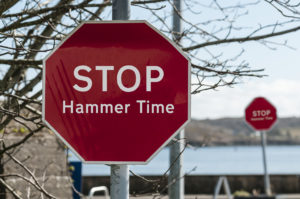U Can’t Touch This: The Limits on Section 75-1.1’s Reach to Out-of-State Conduct
Section 75-1.1 claims involving out-of-state conduct frequently face significant hurdles. A claimant must show a substantial in-state injury for section 75-1.1 to apply. (See here and here.) Choice of law rules can also bar such claims.
Today’s post examines two recent decisions (here and here) applying the choice-of-law rules governing section 75-1.1 claims. Those decisions offer insights into how choice-of-law issues can change the dynamics of a case by jettisoning section 75-1.1 claims early.
Ring the Bell, School’s Back In
Before digging into those decisions, let’s revisit the unsettled question of which choice-of-law rule governs section 75-1.1 claims. Break it down:
Some courts apply the “most significant relationship” test. That test examines several factors to decide which state’s law governs a claim: (1) where the injury occurred; (2) where the conduct creating the injury occurred; (3) where the claimant is located; and (4) where the parties’ relationship is centered.
Other courts apply the “lex loci” test. That test is, in theory, easier to apply. It uses the law of the state where the last act giving rise to the injury occurred, although this can sometimes be difficult to determine.
Although the modern trend favors the “lex loci” test (see here, here, and here), North Carolina’s Supreme Court hasn’t yet weighed in on the issue.
This Is a Beat U Can’t Touch
Let’s now parachute in to the two recent decisions. The defendants in each case moved to dismiss, arguing that section 75-1.1 couldn’t touch their out-of-state conduct because another state’s law applied.
The first decision, Izzy Air, LLC v. Triad Aviation, Inc., involved an airplane crash. Triad Aviation, Inc., located in North Carolina, rebuilt and repaired an engine for an airplane owned by Izzy Air, LLC. Triad Aviation then tested and inspected the engine. It performed all of this work in North Carolina before shipping the engine back to South Carolina.
The airplane’s engine failed during a flight, necessitating an emergency landing in a field in South Carolina. The airplane was damaged beyond repair. Fortunately, the pilot and passenger survived. The airplane’s owner, the pilot, and the passenger then sued Triad Aviation in a North Carolina court for violating section 75-1.1.
In the second decision, Environmental Holdings Group, LLC v. Finch, a North Carolina company sued a former employee for trade-secret misappropriation, violating section 75-1.1, and other claims. The employee, Mr. Finch, reported to the company’s North Carolina headquarters, but he lived and worked in Virginia.
Mr. Finch prepared a bid for Environmental Holdings Group on a project located in Virginia. It was reviewed and approved by his supervisor in North Carolina. Mr. Finch then unilaterally, and without his boss’s approval, submitted additional bids quoting higher prices.
At the same time, Mr. Finch was allegedly trying to get a job with Environmental Holdings Group’s competitor. On Mr. Finch’s last day with the company, its competitor won the Virginia project. After the dust settled, the project’s owner told Environmental Holdings Group that it would’ve gotten the project had it stuck with its original bid.
Mr. Finch joined the competitor immediately after leaving Environmental Holdings Group and continued working in Virginia. He was also allegedly trying to recruit Environmental Holdings Group’s employees to join his new employer. All of Mr. Finch’s allegedly wrongful conduct occurred in Virginia.
Stop, Hammer Time
In each case, the court noted the split of authority on which choice-of-law rule applied to section 75-1.1 claims. Both courts also concluded that, under either the “lex loci” test or the “most significant relationship” test, another state’s law applied—Virginia law in Environmental Holdings and South Carolina law in Izzy Air. Each court then hammered the section 75-1.1 claim. The paths to this result in each case, however, were different.
The result in Environmental Holdings was unsurprising. The court dismissed the section 75-1.1 claim but, given the early stage of the case, allowed the plaintiff to amend its complaint to potentially assert a similar claim under Virginia law. A claim under Virginia’s analogous statute might not be possible, though, as the statute only applies to consumer transactions.
In Izzy Air, the defendant tried to both eliminate the section 75-1.1 claim and prevent plaintiffs from bringing an analogous claim under South Carolina law, which allows business-to-business claims. The court dismissed the section 75-1.1 claim and slammed the door on a South Carolina claim, too. Why? A South Carolina statute-of-limitations defense.
You might be scratching your head, as I was initially. North Carolina’s choice-of-law rules dictate that the forum state’s law governs procedural issues. Statutes of limitation are typically procedural, so North Carolina limitations periods usually apply in North Carolina courts. Why would a North Carolina court apply another state’s statute of limitations?
North Carolina has a borrowing statute that, in certain circumstances, requires application of a foreign state’s statute of limitations. For the borrowing statute to apply, the plaintiff must not be a North Carolina resident, the claim must arise outside of North Carolina, and the foreign state’s law must bar the claim.
The Izzy Air case checked all three boxes. The plaintiffs were located in South Carolina. Thanks to the choice-of-law analysis, the court concluded that the claim arose in South Carolina. Finally, claims under South Carolina’s Unfair Trade Practices Act are subject to a three-year statute of limitations. Plaintiffs filed suit almost four years after the plane crash, so their claims were time-barred.
Takeaways
As we’ve discussed before, choice-of-law issues can be potent weapons in the pretrial procedural dance over section 75-1.1 claims. Lessons learned from today’s cases:
First, a choice-of-law argument could knock out a section 75-1.1 claim and, depending on which state’s law applies, prevent a similar claim under a different state’s laws. This is the likely outcome in Environmental Holdings.
Second, even if another state’s unfair-or-deceptive-trade-practices statute allows business-to-business claims, there could be potent procedural defenses, such as the statute of limitations, that could knock that claim out. This was the result in Izzy Air.



